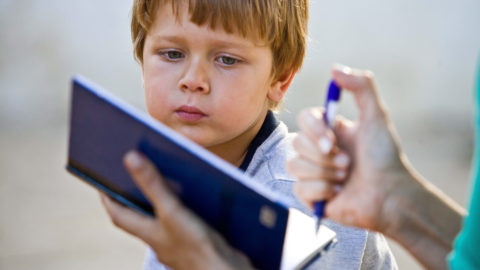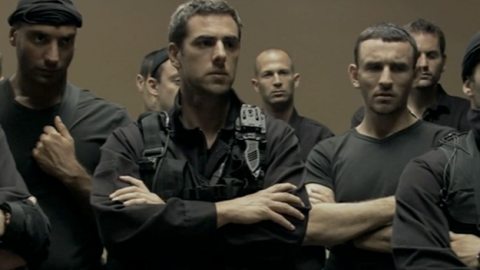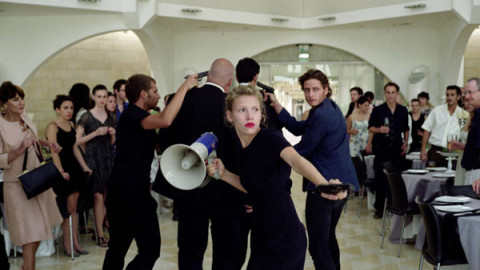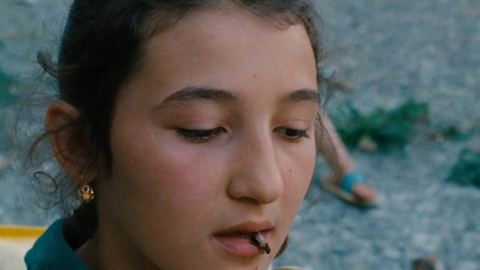ND/NF Interview: Nadav Lapid
Israeli filmmaker Nadav Lapid follows the terrorist tale of Policeman (NYFF ’11) with the rich, sinuous story of a gifted 5-year-old artist and the woman who latches onto him. The Kindergarten Teacher presents the mysterious but unsentimental spectacle of a poet prodigy: when seized by inspiration, heavy-browed Yoav (Avi Shnaidman) paces and recites lines that teacher Nira (Sarit Larry) eagerly records like the follower of a great philosopher. Lapid’s fascinating gloss on the artistic soul and bold reimagining of the child in cinema takes yet another turn as the ideal-driven Nira grows ever more zealous.
FILM COMMENT spoke at length with Lapid last year at the Cannes Film Festival shortly after the film’s premiere. The Kindergarten Teacher begins its run at the Film Society of Lincoln Center Friday, July 31.

I wasn’t sure what to expect from this film having seen Policeman. This is such different subject matter, on the surface. And it’s hard to make a movie at least partly about literature. When did you get the sense that this is something you would actually make a movie about, and that it could work out?
First of all, I have an interest in the use of text in cinema—how words are deformed and transformed by cinema. Objectively, certain sentences can have a certain meaning, but cinema can take them to a very subjective place, and can completely transform their meaning to something else. For example, the radical manifesto [in Policeman] speaks with very classical sentences. Here, I was fascinated by the idea of not only talking about poetry, but transforming words of poetry into an almost substantial thing and yet not falling into the cliché of the poetic film. You know, these poetic films where you see sunshine, sunset, etc. However, in this film, there is a battle, tension, or maybe collaboration between poetry and vulgarity, between poetry and the world, or the universe, and life, which are always also a bit filthy and vulgar. So I wanted the poetic dimension of the movie to come out of the highest and the lowest. And I think the film constantly works on this dialogue between highest and lowest. In the end, this was about me rediscovering the time when I was 5 years old.
Were you vaguely embarrassed by that experience?
For 25 years, I didn’t want to hear anything. I was completely embarrassed. [Laughs] And so it began with the text. You know, it’s not that I think that the poems are good or bad. But I felt that there was something true about their existence. I think that the fact that they are real poems allows you to feel the truth behind them, without any connection to their artistic value. I wanted to put these words in the film and to base the film on four lines—to write a film about a woman who hears four lines and they change her life. I’m happy with the result, and I think that in a way the film is much more existential than the pitch. The pitch might be seen as an idea that’s too good. So I felt that the film should ruin the quality of its concept a little bit. And I hope that the film slaps these poems from time to time.
Yeah, I think it does. And part of that also comes from the use of a child. A child always contains contradictions. Even when he’s really bright, he’s a prodigy, but he’s still just a kid.
Completely. And I think there is always this question of his consciousness. To what extent does he understand that the thing that comes out of his mouth is a poem? And what does he understand by the word “poem”? And does he see himself as a poet? When he hears someone else—such as the babysitter—perform his poem, does he understand that it’s his poem? I mean, is it like a director’s strange remake or criticism of his film? Because we are all conditioned to think in this auteurist way—the idea that the film belongs to its auteur. But is the child aware of this notion of the auteur?
Is auteurism an instinct or is it learned…
Yeah, exactly.

There is an interesting overlap, with the child as an artist, in terms of self-consciousness and unself-consciousness. When I’m doing interviews, I’m sometimes asking filmmakers: “What did you think when you were doing this?” And people are just like: “That’s just… what I felt I was doing.”
Exactly. And when you think about it, the child is able to investigate or to put on the screen the basic act of poetry. This relates to questions like: what is inspiration or what is it like to write? I mean, can you even answer these questions? The kindergarten teacher is like a journalist, who insists on asking: “Where did it come from? Describe the inspiration.” I think that this is a good question to ask knowing that it can’t be answered.
You can just circle it.
Yeah. I think that it’s really important to insist on it even though this determination is vain.
Part of the teacher’s problem lies in trying to control that creative impulse and in trying to hold it up as a symbol beyond itself. And for me, that’s the tie—not that there has to be one—with Policeman: turning an ideal into extremism.
Exactly. For example, the kindergarten teacher goes on a trip to save this kid, or maybe his poems, from everyone, including the kid himself, and to save herself, and to save the universe. These words for her are like an atomic bomb that she is going throw on vulgarity, and she will purify the world. I mean, her aspirations are enormous. She lives in a small apartment in Tel Aviv but she dreams of the sun. The only problem is that she doesn’t have the words. She has this tragic-ness about her, because she knows what should be said but she doesn’t have the means to say it. At the same time, when you take a poem and you transform it to something that has utility, that is a weapon, in a way you also betray poetry or you don’t understand it.
A person who believes in an ideal could be selfless because he believes in an ideal outside of himself, but it ends up being wrapped up in him anyway. The kindergarten teacher obviously has a certain amount of fulfillment in her life, but there’s also something missing, so it ends up being about her.
Completely. I think it’s about her. It’s about her because, in a way, the artist himself is not so interesting. You know, there are all these legends: “Before writing the poem, he would walk from this side to the other. Before writing the poem, he would stand on his head.” These are like gossip, it inflames all these emotions like fascination, jealousy, admiration, violence.
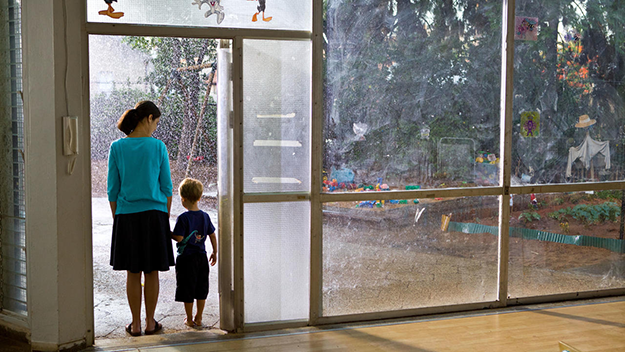
Let’s talk about some aspects of the filmmaking and how you planned that out. I can’t even imagine how you managed to work with the children in that way. Those must have been really stressful scenes to shoot.
[Laughs] There were moments that were almost like a heart attack. That sequence shot, which is very long and heavily choreographed, really depended on those 20 5-year-olds who are in it. Those are moments when you really pray to the God of Cinema to save you.
You get such an interesting dynamic from the main child and his friend. How did you work out their routine? Did they come up with that?
First there was the casting—the decision to have 5-year-old kids. And I had some big hesitation, because I don’t have kids, and two years ago I couldn’t even distinguish a 5-year-old from an 8-year-old. Today, I can identify the kid’s age from his shadow. In the beginning, it was clear for us that we would do more or less what everyone does, which is taking the 8-year-old kid and claiming he’s just had his 5th birthday and hiding it afterwards.
And shoot him from the knees up or something…
Yeah, like 20 years old but childish. But then when we started doing the casting, I noticed that there is a strange combination in this age, 4 to 5, that is very relevant to the film. A great dynamism of thought and imagination on the one hand, and something not totally done, not totally completed on the other—in the way he stands, the way he moves, the way he articulates things. You know, sometimes he even falls down while walking. And I think this has something that’s really relevant to this question of poetry and consciousness and the way we observe things. So I understood that if I want to work with a child, the idea is not to transform him into a small adult but to face this “other,” this mysterious, not entirely completed thing, with an adult camera.
The way the camera works in this film is not like in a children’s film. In front of the camera, they are not adults, they are children. I think that the fact that the camera is not “generous” with the kids is very important. The camera is not progressing towards the kids, it doesn’t say: “Okay, these are kids,” and the kids are not helping it either—in a way, they do whatever they want. So these kids—both 5 years old—quickly developed a relationship that’s quite similar to the one in the film: one admires the other and the other despises him. Well, not despises, but the main kid was completely under the submission of the more powerful kid and this dynamic was precisely accurate. Except that sometimes I had to save them from each other! [Laughs]
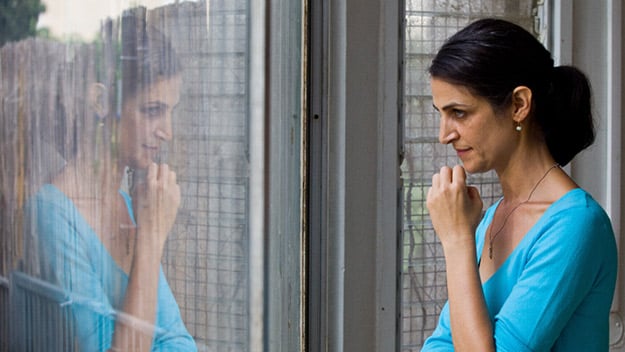
It’s interesting how movies use children, because sometimes it becomes a horror movie—as if the idea of an intelligent child or a child having more autonomy is scary. Or they might make the child less threatening by making her “cute.”
Of course. For me, a child brings to the game this uncontrolled thing in a good way, and this allows the director to challenge his own cinema. Because it’s very tempting at certain moments to do endless mise en scène if you know how to move the camera and you have a good cameraman. So it becomes easily fascinating—a lot of people borrow it and why not? “And then we’ll do another traveling shot, and then we’ll go here,” etc. But I think you must create a contradiction, you must slap this auteurist satisfaction, you must meet your opposite and the opposite is the kid. It’s the same for the kindergarten teacher.
I wanted to ask about Sarit Larry, who plays the kindergarten teacher. What was it like for her to work with the kids?
Very difficult. Also, the kid was very suspicious towards her. I think in a way he tortured her a bit, in the way that the character tortured his kindergarten teacher. She really tried to work with him, and from time to time he would do a nice gesture to show his affection for her, and then automatically take a distance. Usually, you know, actors can act and I don’t believe so much in this idea of creating the same exact dynamics as in life. But here it was really something that came from them. This game of seduction, of his consciousness of his power over her, her permanent attempt to get his affection, and the way he consciously or unconsciously uses it—all these were parallels between the story and the real situation.
Something that also plays into this is the film’s tone and use of humor. It’s amusing for much of the time, but as the movie goes on, it acquires a sinister undertone. That must have been something that you were very carefully cultivating and developing.
I think there is also this dichotomy between humor and sinister tone because of the fact that the humor in the film is a certain kind of humor—we all know these moments when someone says something or makes a gesture which might seem odd or humorous, and you smile and look at his face and you see that he’s not smiling at all. When she sits with the kid in the bathroom and calls him an “honorable poet,” there is this kind of humor. Even when you describe this, it sounds like it might be a lot of things. A 5-year-old stands in front of a woman in the bathroom of a kindergarten and she asks him: “Honorable poet, what do you think about love?” But at the same time, according to her logic—and her logic can easily be respected—this is the thing to do, because if you believe in the power of words and you think words are worth more than life, this kid, who is able to say such words, needs to be asked about them and interviewed. And she should look at him and ask him in the middle of this Hanukkah song: “How does the poet observe reality?” So I think that’s why it’s funny and not funny, and sometimes it’s a little bit dangerous, but there’s a real truth in it.

Another movie that had this kind of story might have something about the media in it: getting famous, going to the news, etc. But you don’t take that path at all.
No. It’s a little bit like Policeman, this anonymous hero. At the end, you feel like this strange tale would be known more or less only to its participants. And that’s why they’ll also have to carry it with them for the rest of their lives or whatever.
It’s a story that the cops would tell each other.
Exactly.
Are you working on a new story now? Will you still be working in Tel Aviv?
My next film will be shot in Paris. It’s a film about an Israeli guy going to Paris. It’s from the Israeli point-of-view but it’s a little bit on this Israeli-Europe, Tel Aviv–Paris axis.
What’s it about?
It’s about an Israeli guy who tries to become French. But about being a filmmaker these days… I remember once—and this is maybe something that drew me to make this film—Olivier Père, the head of ARTE, was talking about debut filmmakers and said that people tend to say that years ago cinema was better. But he thought that this generation is the first generation of big filmmakers who don’t have a public anymore. I mean, you can nuance this and say it’s not that horrible. When you see all these people eager to watch a wonderful film like Winter Sleep [also screening in Cannes], you might think there is still hope. But it’s true that there is a marginalization of a certain genre and of a certain way of thinking about cinema, which is worrying. And even if these things are not going to disappear, the fact that they are becoming marginalized might change their essence. So I think being a filmmaker today sometimes feels like you’re going in one direction and there’s a thousand people going in the other. But I don’t necessarily mean this in a heroic way.
I guess some filmmakers respond by working in TV. Is that something you are interested in at all?
No, not that I have anything against it but… I’m not a big consumer of TV series. I know that there are some TV series that are supposed to be excellent. I can’t even judge if it’s real myth—you know, people who say that big Russian works like War and Peace equal The Sopranos. I’m ignorant about it so I can’t judge. But I think that there’s something about the uniqueness of movies that enables you to make something that is not only developing the characters. People always talk about how the characters are interesting and all that. I think film enables you also to ruin the story. As I’ve told you, I for instance tried a little bit to deform the pitch, to deform the story. And this is something that for me you are not committed to do in a TV series.

Who are some filmmakers that you like who ruin or deform in that way?
I’m a big fan of Nuri Bilge Ceylan and Carlos Reygadas. He definitely ruins the story—in a good way! [Laughs] And Elia Suleiman. It’s this uncontrolled thing in a movie that, without sounding too banal, is a little bit like poetry. Poetry from the point of view of something unpredictable, not always understood. It’s strange to tell a poet: “I didn’t understand the development of your poem.” I mean, you wouldn’t speak like this. And there is a certain genre of cinema that still permits this way of thinking, but you have the feeling that it’s opposed to the majority who demands answers and development all the time and that it can be pitched and financed and applied to a capitalist or consumerist way of thinking.
In certain poems, for instance, you don’t know until the very end—and it’s really hard to judge—if you’ve heard the deepest truth or a kind of vain thing. It moves all the time between two poles: it might be the deepest truth or it might be nonsense. Quite often cinema is demanded to be in the middle because it’s demanded to be an acceptable truth, which will prevent it from going deeper. At the same time, it’s protected. No one would say it’s nonsense.
Right. It has to be plausibly radical.
Yeah, exactly.
So you said you don’t have any kids. How did this experience make you feel about having kids?
When I was studying film in film school, I used to make wedding videos to make some money. And I promised myself that I would never get married, and four years later I got married. Let’s see if it will be the same with kids! [Laughs]



